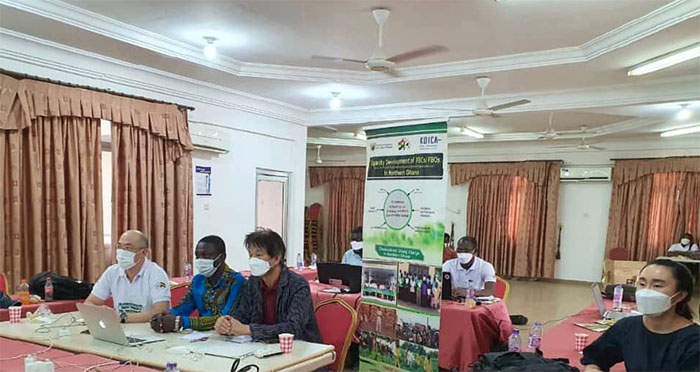Exit Meeting for KOICA Farmer Cooperatives Project held in Tamale
The Korea International Cooperation Agency (KOICA), which is a Republic of Korea government agency dedicated to overseas grant aid programs organized an exit meeting for one of its projects in Ghana held in Tamale in the Northern region.
KOICA, through the “Capacity Development of Farmer Based Cooperatives and Organizations (FBCs/FBOs) in Northern Ghana Project” has been one of the major partners supporting cooperative development in Ghana.
The project ultimately sought to improve the quality of life of rural residents in northern Ghana .
An on-line exit meeting was organized between KOICA and the key collaborating institutions of the project who are the Ministry of Employment and Labour Relation (MELR) and the Department of Cooperatives (DOC) as part of closing formalities for the project. Among other things, the exit meeting provided the platform for stakeholders and partners to reflect on the project’s achievements and successes.
The Project Management Service took the opportunity to share some key lessons learnt in the course of implementing the project with its local partners. A number of recommendations particularly those related to cooperative policy reforms were proffered by KOICA as part of the forum.
KOICA Ghana Country Director Mr. Mooheon Kong disclosed that all components of the Project were implemented according to plan adding that the project attained 100% implementation in all components except invitational training program pilot project.
According to him, a 95% overall project implementation was attained and that the global pandemic of COVID-19 obviously affected the full implementation of the invitational training program.
“This notwithstanding, the project made very significant gains in improving the living standards of beneficiary farmer-groups and their households in the project intervention areas. The successful implementation of the Project would not have been possible without the cooperation and leadership of the Ministry. We are grateful for the support offered the Project.”
The Project Manager for the KOICA FBCs/FBOs project, Professor YOON, Hae-Jin , as part of his presentation, cited some key achievements of the project. Notable among them were the various a capacity building programs which included the training of 101 officers from various state agencies under the “Training of Trainers” component, the training of 630 farmer cooperative leaders under the “Training of Farmer Leaders” component and the training of 30 Ghanaian public officers in the Republic of Korea under the “Overseas Invitational Training” component.
He noted that the project had directly supported businesses of some 146 Farmer Cooperatives groups with over $500,000 under the “Training of Farmer Leaders Action Plan Support” and the “Pilot Project” components of the project.
He further revealed through his presentation that the project had been instrumental in forging market linkages and business networks between farmer cooperatives and various players in the agricultural value-chain through the Mobile Market Platform and Fair events which were integral aspects of the project.
Prof. Yoon shared some key findings of the project’s endline survey which highlighted some socio-economic contributions the project made in the intervention areas. Typical among such findings was the improved standard of living measured among the project’s beneficiary households and communities.
“The Poverty Probability Index (PPI) which formed a basis for assessing quality of life during the end-line survey revealed that poverty among households of beneficiary cooperatives had reduced by 2.6 points since the inception of the project while households of non-beneficiaries recorded only 0.2-points reduction.”
The endline report further revealed that household income for members of the beneficiaries was 31% higher than that for non-beneficiary.
A number of success cases recorded showed that Cooperatives were actively contributing to the socio-economic development at the community level through the provision of alternative livelihood, job creation and several social interventions in areas such as education and healthcare of members and community.
Prof. Yoon remarked that there was a need for government to pay more attention to the cooperative movement since it could serve as an avenue for socio-economic development in Ghana.
A speech read on behalf of the Department of Cooperatives, Mr Emanuel Awuni proposed measures the Department planned to implement to sustain and scale-up the gains of the Project.
All stakeholders were unanimous on the need for a new Cooperative law to replace the outdated 1968 ACT on Cooperatives which is still in use. It was also agreed that a national policy on cooperative was paramount in ensuring the rapid transformation and repositioning of the cooperative movement to align with the nation’s needs.
The other local partners include the Department of Agriculture (DoA), the National Board for Small Scale (NBSSI) and department of Social Welfare and Community Development (SWCD).
The KOICA FBCs/FBOs Project which spans between January 2017 and March 2021 was funded with a $6.18 million. Its expected outcome was an increased in role of FBCs and FBOs in rural development. Twenty-one districts in the five Northern regions are participating in the project with 210 FBCs/FBOs enlisted under the project.
The project met its targets which were compartmentalized into 6 main components namely Training of Farmer Leaders (TOL), Training of Trainers, Invitational Training, Networking Marketing and Fair, Pilot Project and the Policy Advisory and Advocacy components.
FROM Eric Kombat, Tamale

